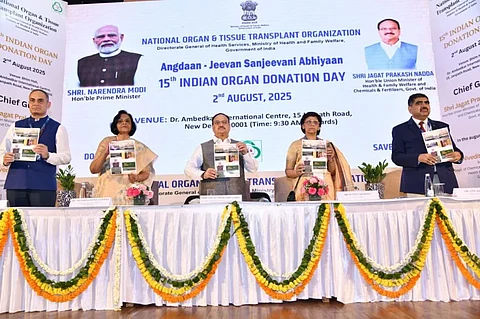

Union Health Minister J.P. Nadda announced that India has achieved a historic milestone by performing more than 18,900 organ transplants in 2024, the highest number recorded in a single year. This marks a dramatic rise from fewer than 5,000 transplants in 2013.
Speaking at the 15th Indian Organ Donation Day event organized by the National Organ and Tissue Transplant Organisation (NOTTO), Nadda highlighted India’s rise to the third position globally in terms of total organ transplants, following the United States and China. He also proudly stated that India now leads the world in hand transplants, a testament to the country’s advanced surgical expertise and the commitment of its healthcare professionals.
Nadda raised concerns over the increasing burden of organ failure, which poses a major threat to public health and puts additional pressure on the healthcare system. He emphasized that thousands of patients await organ transplants every year, yet the availability of organs remains critically low.
“This shortage isn’t due to a lack of generosity, but often stems from a lack of awareness and the persistence of myths and misconceptions,” he said. He stressed that Organ Donation Day serves as a vital platform to promote public awareness, encourage dialogue, and honour the selfless acts of donors and their families.
Highlighting growing awareness, Nadda revealed that since the launch of NOTTO’s Aadhaar-linked online organ pledge platform in 2023, over 3.3 lakh citizens have committed to organ donation. This increase reflects a positive shift in public perception and participation.
Recognising the efforts of healthcare professionals, he attributed the record-breaking transplant numbers to their dedication and skill. He also announced that the Health Ministry has directed states and medical institutions to create permanent posts for transplant coordinators, ensuring better coordination and support across the system.
Despite progress, Nadda underlined the persistent mismatch between organ demand and availability, calling for more public awareness campaigns, family consent education, and a robust donation support framework.
"Every donor is a silent hero whose gift can save up to eight lives—through the donation of the heart, lungs, liver, kidneys, pancreas, and intestines. Tissue donation can help even more," he said. "Organ donation is one of the noblest acts of human kindness."
To aid low-income families, the government offers financial support of up to ₹15 lakh for organ transplants under the Rashtriya Arogya Nidhi, and ₹10,000 per month post-transplant for medical expenses. The Ayushman Bharat PM-JAY also covers kidney transplant packages, ensuring broader access to critical care.
Nadda also urged citizens to adopt healthier lifestyles to reduce the risk of organ failure. "Unhealthy food habits and sedentary routines are key contributors to organ damage," he said, promoting yoga and Ayurveda as preventive tools to strengthen organs and enhance immunity.
He concluded with a message inspired by Prime Minister Narendra Modi: “Reducing oil consumption by 10% is a small yet impactful step toward a healthier, disease-free future.”